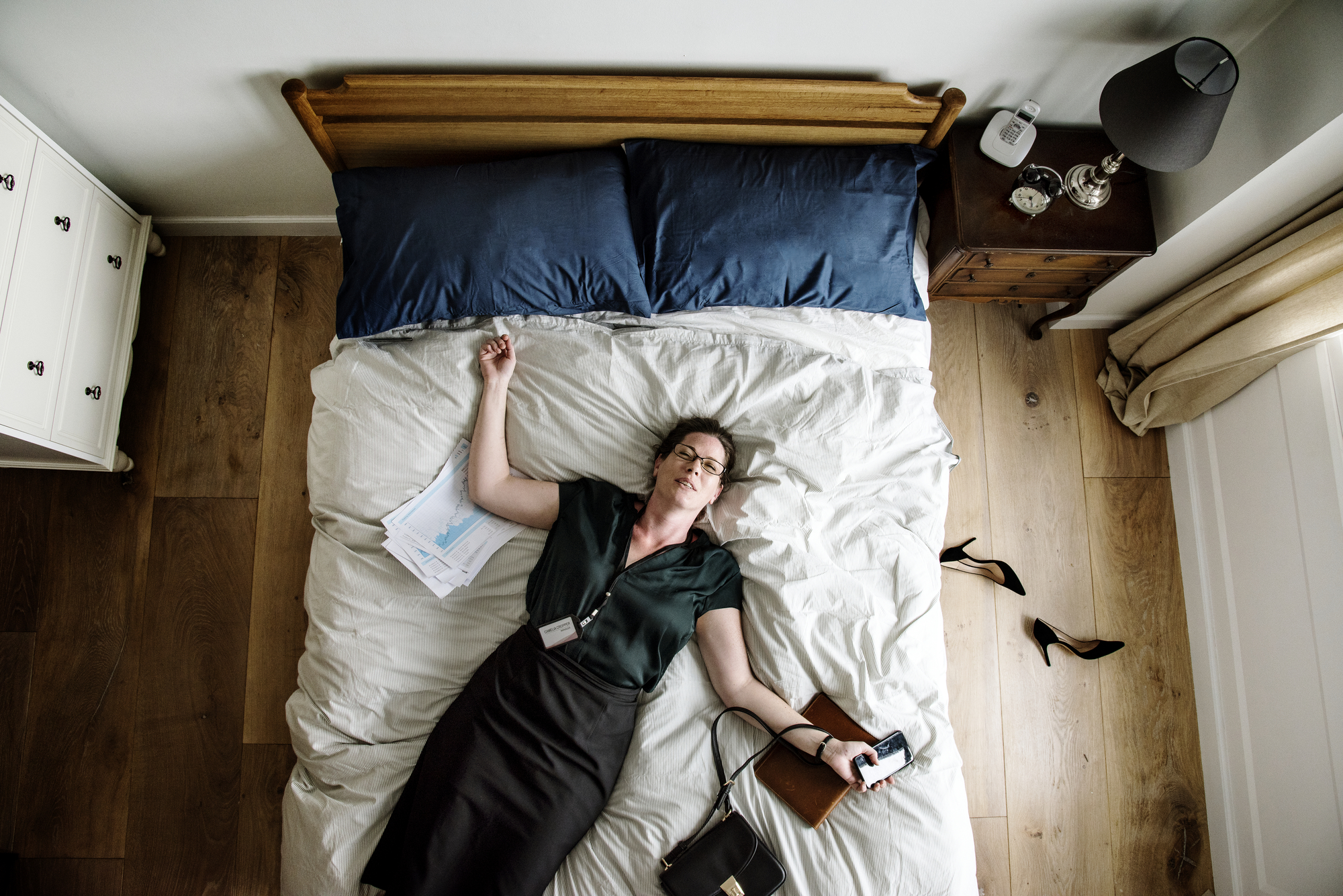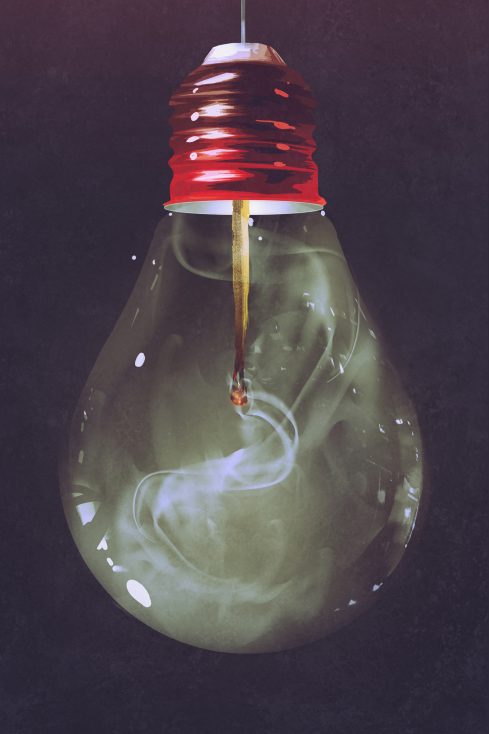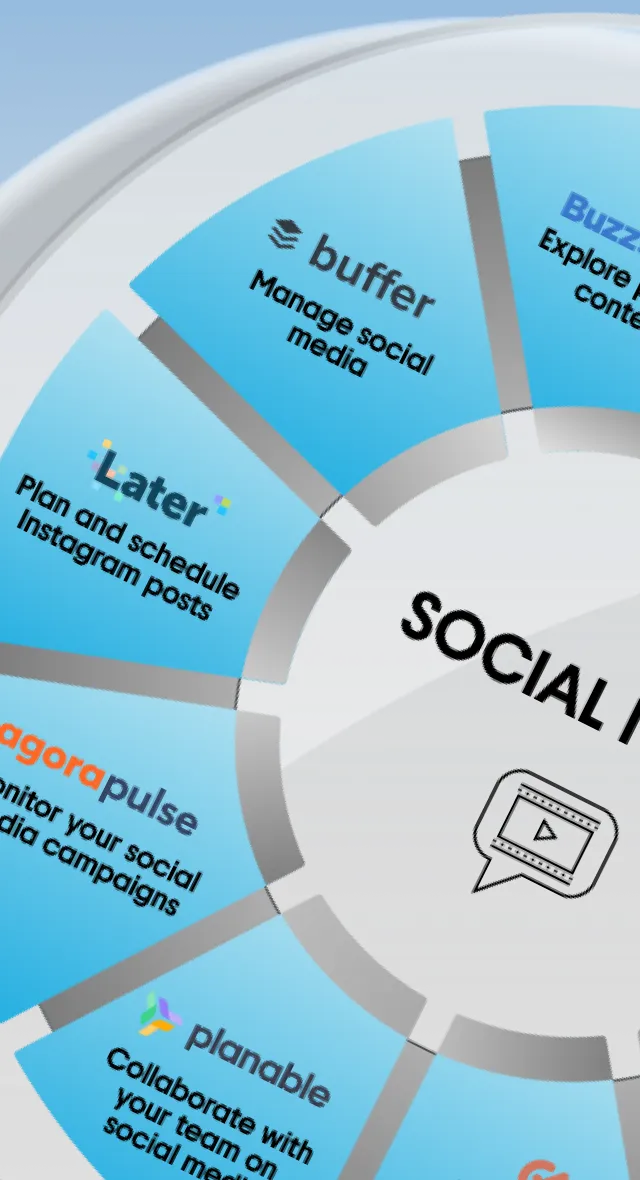How to Identify, Prevent, and Recover from Burnout: Tips for Creatives
Have you been feeling exhausted and extremely unproductive recently? Burnout is on the rise, so you’re not alone. According to a survey by Indeed, 52% of respondents have experienced burnout within the past year. This is alarming information because burnout can have a detrimental effect on your mental and physical health.
In November and December, when everyone’s more busy than ever, the chances of experiencing burnout only increase. This is why we’ve collected everything you need to know about burnout: symptoms, treatments, and ways to prevent it. And there’s a list of relevant book recommendations at the very end. Keep on reading to prepare yourself for the most stressful time of the year.
What is burnout?
Burnout is a medical condition that includes mental, emotional, and physical exhaustion. It’s typically related to prolonged, work-related stress, and it’s incorrect to talk about burnout in regards to similar mental states caused by other areas of life.
However, if you take care of your family full-time, you can burn out because that’s your occupation. Don’t let anyone try to prove otherwise. Being a stay-at-home parent is a full-time job.
The term “burnout” was coined by psychologist Herbert Freudenberger in 1974. He introduced it in his book Burnout: The High Cost of High Achievement. This is the original definition of burnout in the book: “the extinction of motivation or incentive, especially where one’s devotion to a cause or relationship fails to produce the desired results.”
It took 40 years of research and heated discussions among medical professionals for burnout to be recognized as an actual medical condition. It finally happened when it was included in the 11th edition of the International Classification of Diseases in 2019. Just in time for the pandemic!
Work burnout: symptoms, signs, and consequences
According to the ICD, there are three dimensions that characterize burnout:
1. “feelings of energy depletion or exhaustion”
2. “increased mental distance from one’s job, or feelings of negativism or cynicism related to one’s job”
3. “a sense of ineffectiveness and lack of accomplishment”.
The most common signs of burnout are:
– concentration issues
– forgetfulness
– irritability at work
– sleep issues
– muscle pain
– recurring headaches
– lack of energy
– emotional exhaustion.
Potential consequences of burnout:
– fatigue
– high blood pressure
– insomnia
– type 2 diabetes
– alcohol abuse
– emotional overeating
– heart disease
– low immune system.
Who is most likely to burn out?
Initially, burnout used to be a common issue among workers in health care, social work, advocacy and community organization, child welfare, public welfare, and education. In short, helping professions.
Today, people are more prone to burning out for a number of reasons, which we’ll cover in a bit. However, it’s important to emphasize that teacher and doctor burnout are still the most common and extreme. And as we’ve already mentioned, caregiver burnout is a thing, and it’s real.
Also, certain personal circumstances can increase your chances of burning out: being a high achiever, striving for perfection, being a pessimist, having the need to be in control, and being unwilling to delegate.
The most common burnout causes
Lack of agency at work. If you are unable to have any impact on your working circumstances, you might eventually face burnout. Most people function within certain rules and restrictions, but it’s important to have at least some kind of control over what you do; like when and how much you work.
Excessive workload. You might be the most productive professional, but having too much on your plate isn’t a good long-term strategy. A constantly overbooked schedule and a workload that surpasses your capacity will eventually decrease your efficiency, development, and growth. And various health-related issues will follow promptly.
Unhealthy work environment. Dealing with passive aggression, bullying, conflicts, and even micromanagement increases stress levels. If there’s someone, in particular, creating an unhealthy dynamic, reach out to your manager or HR. And if the situation gets worse, consider looking for a new job. A safe and supportive work environment can do wonders both for our well-being and productivity.
Lack of work-life balance. This isn’t a silly trend that millennials have made up. It’s actually an important requirement for our overall well-being and health, productivity, and a sense of fulfillment. When you don’t have any free time for your hobbies, friends, and family, you might be nearing burnout.
The COVID-19 pandemic. A lot of us wish we could stop hearing this word over and over again, but there’s no help in ignoring the circumstances we’re in. Working from home, going to work and facing danger every day, taking care of children while performing your tasks, being anxious about friends and family, not knowing what tomorrow will bring. Stress has skyrocketed due to the pandemic and it has been affecting everyone’s lives for almost two years.
How to identify burnout
It’s challenging to accept having burnout and recover from it. Why? You might be a victim of intense self-doubt or low self-esteem. It might feel like you are “just being lazy”, unproductive, or not good enough. Or that you’ve made a wrong career choice. Seeing that everyone is so busy and stressed out, while “living their best life” doesn’t help either.
However, our well-being is our key responsibility, so it’s important to leave all of those distracting factors aside, and do more research. We’ve got your back!
Is it burnout or is it stress?
Stress can lead to burnout, but they’re not the same thing. Actually, there’s a very important distinction to make between the two.
Stress is about being too full or having too much of something, while burnout is about being empty or not having enough. We get stressed out when we have too many obligations, but we’re still motivated to deal with them and are capable of doing so. However, when we’re burnt out, there’s no moral or physical energy left, no motivation. Instead, there’s a sense that one is capable of nothing.
Being in a stressful situation doesn’t prevent you from knowing that things will improve. Usually, you know that they will as soon as you meet a deadline or solve an urgent problem. And sometimes, these circumstances help you go through a rough patch and come out of it relieved.
But when it comes to burnout, there’s often an absence of hope. It might seem like your situation will never change, and you might not even care about it. You’ve got nothing left in you. And on top of that, there’s a chance that you won’t be aware of how you’re feeling, whereas stress is usually pretty obvious and easy to spot.
Is it burnout or is it depression?
Burnout shares a few similar symptoms with depression: lack of energy, irritability, sleep issues, lack of motivation and hope. It doesn’t make it the same condition though.
Depression usually entails feeling very sad, losing interest in life – not just work, changes in appetite and weight, inability to control emotions. It’s completely natural to experience each of these things from time to time and for brief periods, but if you’re dealing with a number of these symptoms long-term, it might be a sign of depression, so it’s better to talk to a mental health professional.
Some cases of depression can even lead to suicidal thoughts or attempts. If you’ve had them, please reach out to a doctor immediately. We know that it can be extremely difficult and scary to do that, but there’s no shame in asking for help. Actually, it’s the best thing you can do! There are professionals that can help you feel better, even though it might seem impossible to you right now.
Burnout, on the other hand, is all about work. The symptoms can be very similar, but they will usually dial down on the weekends, or during holidays and vacations. It’s important for you to know that ignoring burnout can eventually cause depression, so the earlier you clarify your situation and start making changes, the better.
Burnout self-test
By this point, you might have a pretty clear understanding of what burnout feels like, but it can still be difficult to figure out whether you’re going through one right now. If you’re feeling emotionally and physically depleted, asking yourself a few questions from the list below can be useful.
Do you feel emotionally and physically exhausted?
This is the most important question you can ask yourself. Your next step is to run a simple experiment – sleep enough and organize a weekend that is focused on rest. If your state will improve afterwards, it means that you were very tired, but not burnt out. However, if it doesn’t – you need a plan for burnout recovery.
Do you struggle with focus and concentration?
On the one hand, social media has been ruining our concentration skills for years. On the other hand, it’s a good idea to track how much time you need to perform your regular tasks. Use the Pomodoro technique to test your focus and results.
Do you appreciate the results of your work?
This is a tricky one because the inability to see value in what you do can also be a sign of low self-esteem or impostor syndrome. However, if your answer is “no”, and you have some of the other burnout signs, it’s reasonable to pay closer attention.
And a few more additional questions if you have the energy to answer them:
– Do you feel extra frustrated and negative at work?
– Have you been consuming more junk food and alcohol?
– Do you have any new health issues?
You don’t need to answer all of them at once, and you can also save them for later. This checklist can be a helpful tool in keeping an eye out on how you feel, and figuring out whether you need to change anything in work and life.
How to deal with burnout as a creative
The first step is to recognize that you have it. You need to name the problem to find the right solutions and implement them.
After you accept burnout as the state you’re currently in, it’s necessary to take action. Yes, it can be a daunting thought when you feel like you have no energy left, but it won’t go away on its own. Don’t worry though. You don’t have to do it all by yourself. We’ve prepared a list of tips and a few reading recommendations that can help as well.
Reorganize your life to prevent burnout from happening again. If you go back to your previous behavior patterns as soon as you start feeling better, recovery might not last. Learn your lessons and make your well-being a priority. It’ll take a while, but it’s definitely worth it.
How to recover from burnout: tips for creatives
Seek professional help. Mental health is no joke, so it’s always best to reach out to a counselor or a therapist. They can provide the support you need right now, as well as create a recovery plan and help you follow through.
Prioritize rest. Yes, it’s much easier said than done, but it’s crucially important to recharge your body. Especially right now! Take a few extra days off, a sick leave, or go on vacation if you can. Not everyone can afford to do that, but benefit from any opportunity to rest because it’s the most important and effective treatment of burnout.
Sleep more and better. Pay attention to your sleeping routine and make sure that you sleep enough hours. Start following a routine that will help you calm down, go to bed earlier, fall asleep faster, sleep better, and wake up easier. At first, you will probably need to sleep more than usual as compensation.
Go outside. The combination of being active and in nature can do wonders for your mental and physical health. If your schedule is usually overloaded with work, it can be difficult to go out for walks, but this is exactly what you need to do. If you’re taking some time off, make sure that you spend it outside. And if you continue working, go for a short walk before or after work, or during your lunch break. Start small – 15 minutes a day can eventually turn into 30 minutes, and then even an hour or more. Make sure that you’re not on your phone while you’re doing it though!
Surround yourself with friends and family. Be vulnerable and let them know what you’re going through. Share, get the support you need, and ask for help with some of your responsibilities. But don’t stop there. Make an effort to organize something enjoyable and fun depending on what you and your loved ones prefer. Maybe explore a new hobby together. Create new memories and strengthen your bond with the people who matter the most.
How to prevent burnout as a creative
Adopt healthy habits. Don’t overwhelm yourself by thinking that you need to do everything at once. Take some time to evaluate your well-being and daily routine. What do you need to change? Maybe it’s how you eat, or a lack of physical activity. What matters the most? Potentially, it’s your sleeping hygiene. And what can you do right now? Make a plan and stick to it. Change one habit at a time to achieve long-term success and health improvements.
Do less, learn to say “no”. Being proactive and responsible is both a blessing and a curse. Sure, a side-gig or a new project at work might sound appealing, but will you be able to maintain them long-term without causing damage to your health? There’s no better way of preventing burnout than being more strict with what you agree to do.
Protect your mental health. Sometimes, we pay a ton of attention to our bodies, while completely ignoring our minds. Let’s change that! Choose a few practices that will enable you to take care of your mental health. For example, try journaling now and then meditating next month. And, of course, therapy is an extremely powerful tool that can help you deal with conditions such as burnout, anxiety, depression, and more.
Books on burnout
If you’re eager to learn more about burnout and make some dramatic changes to your life, reading a few books can be of great help. These are some of the most trustworthy, research-based and in-depth options:
1. Burn-out: The High Cost of High Achievement Book by Geraldine Richelson and Herbert Freudenberger
2. Burnout: The Secret to Unlocking the Stress Cycle by Amelia Nagoski and Emily Nagoski
3. Can’t Even: How Millennials Became the Burnout Generation by Anne Helen Petersen.
More books about mental health
1. Effortless: Make It Easier to Do What Matters Most by Greg McKeown
2. Notes on a Nervous Planet by Matt Haig
3. The Happiness Hypothesis by Jonathan Haidt
4. The Burnout Epidemic: The Rise of Chronic Stress and How We Can Fix It by Jennifer Moss
5. Unf*ck Your Brain: Using Science to Get Over Anxiety, Depression, Anger, Freak-Outs, and Triggers by Faith G. Harper.
Wrapping up
If you have several signs of burnout, please don’t ignore them. Pay closer attention to how you’re feeling and what your work life is like right now.
Consider taking a few extra days off, dedicate them to recharging through sleep, sports, and other activities that can help you recover from burnout. Look for ways to change your work situation and make it healthier in the long-term. Reach out to people – mental health professionals and your friends and family. And always remember that you’re not alone. Be gentle and take care of yourself!



















